Sliding right into our D(rea)Ms with the new game from Furniture & Mattress
When I was younger, I was enamored with the little sliding puzzle toy that was in my dentist’s office. It was a picture of a tooth, and it would sometimes take me several minutes to figure out how to get the tile on the bottom right back to the middle without screwing everything up. But when I finally did it was some of the most satisfaction that one could have as a 6 year old. Arranger, from developer Furniture & Mattress, taps into that sliding tile mechanism but it’s far less about frustration and far more about using the simple gameplay to tell a multi-layered story in a game that’s both compelling and refreshingly fun.
I was a kid again, and fully addicted.
The hands-on demo at Summer Game Fest is the opening sequence of the game, focusing on learning about the gameplay and puzzle-solving process. For a game that may look complex (especially with some of the later puzzles) it’s absolutely accessible and easy to understand. The controls are minimal: just push left and right, up and down. And that’s it. Move to solve puzzles. Just move! The premise is that our lead character, Jemma, is a bit of a misfit. And outcast. And she’s not necessarily liked by the rest of the townsfolk, mostly because she causes chaos where she goes.
This idea that she’s “dragging” the world behind her (alluding to the notion that one’s past is always there, always affecting their path, difficult to leave behind) is portrayed smartly in the concept of the sliding tiles. Jemma is always facing forward when she moves, and everything behind her seems to follow her along, often picking up objects and moving them. In one area I came upon a town resident on a ladder, but because they were in my row each time I slid forward I would cause their ladder to slide and wobble, until they eventually fell over (ultimately causing them to dislike me even more).
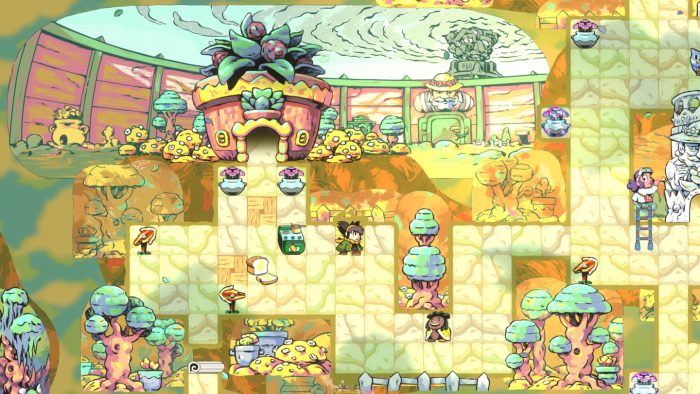
The puzzle-solving is built upon accessibility and intuitiveness of how to play; we just start moving, and we’ll figure it out. None of the puzzles are impossible, and it’s not even about trial and error. It’s really about learning the mechanisms of the world. At some point we may even come upon a puzzle and just feel that we know how to solve it. We may not know the exact solution but because we know enough of the world we’ll be able to understand its expectations of us. Once we take our first steps — er, slides? — we find out how innovative the game really is. The sliding isn’t just for our own movement, but the movement of the world around us. We move items, we avoid obstacles, we find keys to unlock doors. The game doesn’t have an inventory, instead we have to slide items into place to use them. This translates to the game’s “battles” as well. The battles (in the demo, at least) are set up in areas with a set number of weapons. To use a sword, for instance, we slide it towards an enemy to attack it. The hook is that we have to figure out how to get enough swords to take out an enemy. For example if an area has three swords, we may need to use one to attack, one to act as a weight on a trigger to be able to reach a sword behind the enemy to attack it, then get back to the other side and use that trigger sword to slide over and deal the final blow.
One puzzle took me several tries to figure out how to solve. I could tell that the developers were getting a little antsy watching me, but that’s the magic of a game like this. I need to keep failing, to keep missing an opportunity before I finally figure it out. And then I have that solution in my brain that will help me solve the next puzzle, and the next and the next. The developers on site, Nick Suttner and Tomás Batista, explained to me that there are a hundred different ways to solve the puzzles, and they welcomed seeing players bring their own ideas to the experience. I felt proud solving one and hearing them mention that it was the first time they’d seen someone accomplish that specific goal in that way. And if for some reason we’re having trouble advancing past something, accessibility options in the game allow us to skip a puzzle without issue. The frustration of solving puzzles isn’t the point of the game, it’s the love of puzzles themselves that should keep us moving.
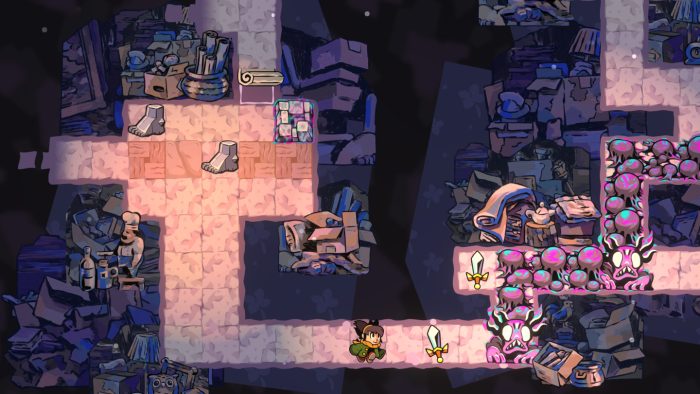
And while this is clearly a game with compelling and challenging puzzles as its gameplay, Suttner explains to me that it’s really built around being a breezy adventure game that tells a story about acceptance and personal growth. The puzzles are the verbs and vocabulary of how Jemma expresses her interaction with her world. We need to understand the world as much as we can, because that will ultimately affect how she progresses in it, and how her story is told. We even see some of her perspective in the floating art in the background, known as “shards” that depict how she remembers and views different situations. The music, directed by Batista, is yet another layer to the experience. Batista was able to use a variety of sounds, including traditional South American, acoustic and modern electronic instruments, to express the emotions that Jemma feels when she comes across different situations and to signify the different aspects of the the game.
Arranger is a puzzle game that uses adventure and story as a sort of trojan horse to expose puzzle solving to people who may not be the biggest players of the genre. Through Jemma’s adventures, Furniture & Mattress essentially want us to understand that though we carry our pasts along with us they may ultimately allow us to move forward.
Arranger arrives on July 25th for PC, Mac, Steam, PS5, Switch, and Netflix. A demo is currently available on Steam.

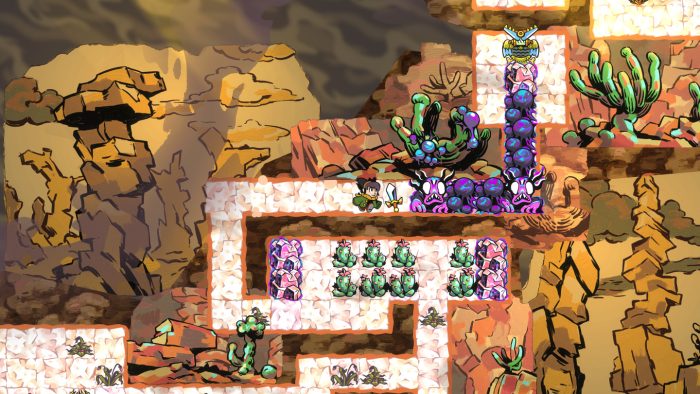
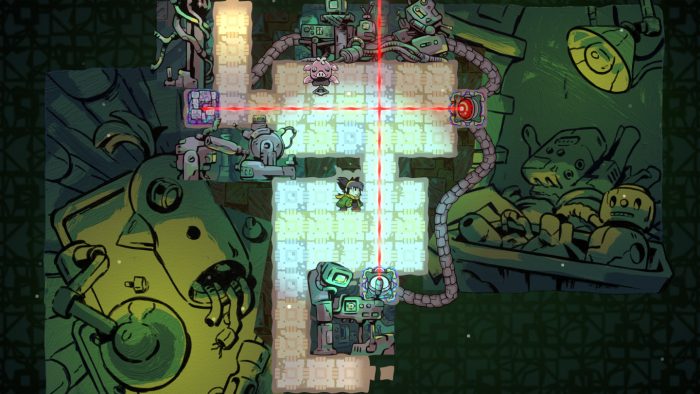


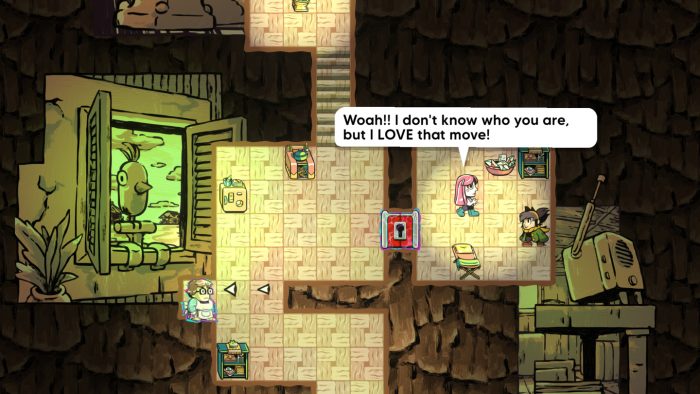
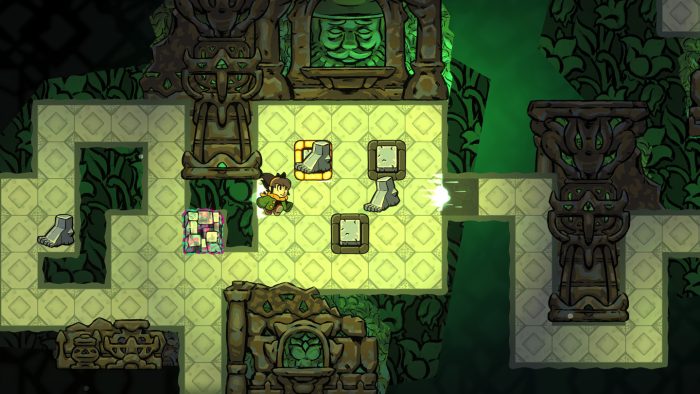


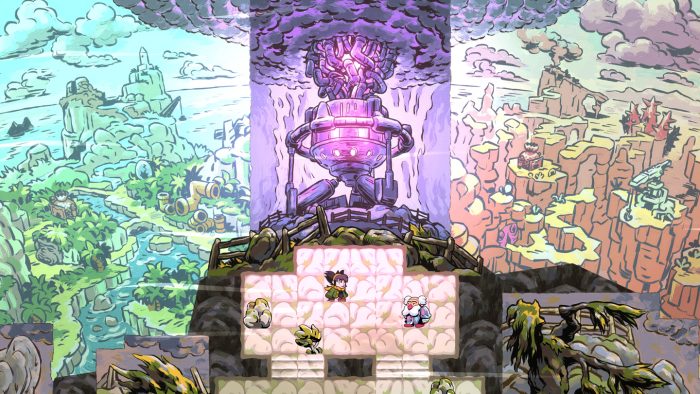

![[Hands on preview] Arranger: A Role-Puzzling Adventure is a delicious puzzle adventure](https://www.sidequesting.com/wp-content/uploads/arranger-preview.jpg)
No Comments